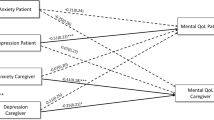Abstract
COPD (chronic obstructive pulmonary disease) is associated with psychological distress for patients as well as their partners. Dyadic coping can be negatively impacted by stressors. This study’s objective was to compare the dyadic coping of couples in which one partner suffered from COPD with healthy couples of the same age. A total of 43 complete couples with COPD and 138 healthy couples participated in this pilot study. The surveys were sent by mail. The response rate of the COPD sample was 24.3%. In order to analyze the effect of gender and role (patient vs. partner) on dyadic coping, linear mixed models were calculated. To analyze the effect of gender and group (COPD group vs. normative comparison group) on dyadic coping, two-way analyses of variance were calculated for independent samples. COPD patients and their partners indicated that the patients received more support and were less able to provide support to their partners. This difference was also evident in comparison with the normative comparison group. In addition, couples with COPD perceived higher levels of negative coping and provided a considerably lower assessment of their positive dyadic coping. The dyadic coping of couples with COPD is unbalanced and more negative when compared to that of healthy couples. Interventions aimed at supporting COPD couples should seek to improve couples’ dyadic coping in addition to individual coping strategies.
Similar content being viewed by others
References
Ashmore, J. A., Emery, C. F., Hauck, E. R., & MacIntyre, N. R. (2005). Marital adjustment among patients with chronic obstructive pulmonary disease who are participating in pulmonary rehabilitation. Heart and Lung, 34, 270–278.
Blumenthal, J. A., Keefe, F. J., Babyak, M. A., Fenwick, C. V., Johnson, J. M., Stott, K., et al. (2009). Caregiver-assisted coping skills training for patients with COPD: Background, design, and methodological issues for the INSPIRE-II study. Clinical Trials, 6, 172–184.
Bodenmann, G. (1997). Dyadic coping—a systemic-transactional view of stress and coping among couples: Theory and empirical findings. European Review of Applied Psychology, 47, 137–140.
Bodenmann, G. (2000). Stress und Coping bei Paaren [Stress and coping in couples]. Göttingen: Hogrefe.
Bodenmann, G. (2005). Dyadic coping and its significance for marital functioning. In T. Revenson, K. Kayser, & G. Bodenmann (Eds.), Couples coping with stress: Emerging perspectives on dyadic coping (pp. 33–55). Washington, DC: American Psychological Association.
Bodenmann, G. (2008). Dyadisches Coping Inventar (DCI) [Dyadic Coping Inventory]. Bern: Huber Testverlag.
Bodenmann, G. (2010). New themes in couple therapy: The role of stress, coping and social support. In K. Hahlweg, M. Grawe, & D. Baucom (Eds.), Enhancing couples: The shape of couple therapy to come (pp. 142–156). Cambrige, MA: Hogrefe.
Bodenmann, G., Widmer, K., Charvoz, L., & Brandbury, T. (2004). Differences in individual and dyadic coping in depressed, non-depressed and remitted persons. Journal of Psychopathology and Behavioral Assessment, 26, 75–85.
Booth, S., Silvester, S., & Todd, C. (2003). Breathlessness in cancer and chronic obstructive pulmonary disease: Using a qualitative approach to describe the experience of patients and carers. Palliat Support Care, 1, 337–344.
Büchi, S., Brändli, O., Klingler, K., Klaghofer, R., & Buddeberg, C. (2000). Stationäre Rehabilitation bei Patienten mit chronisch obstruktiver Lungenerkrankung (COLK): Effekte auf körperliche Leistungsfähigkeit, psychisches Wohlbefinden und Lebensqualität [Rehabilitation among patients with chronic obstructive pulmonary disease (COPD): Effects on physical functioning, psychological well-being, and quality of life]. Schweizerische Medizinische Wochenschrift, 130, 135–142.
Burr, W. R., & Klein, W. R. (1994). Reexamining family stress. Thousand Oaks, CA: Sage.
Cannon, C., & Cavanaugh, J. (1998). Chronic illness in the context of marriage: A systems perspective of stress and coping in chronic pulmonary disease. Family, Systems and Health, 16, 401–418.
Carstensen, L. L. (1992). Social and emotional patterns in adulthood: Support for socioemotional selectivity theory. Psychology and Aging, 7, 331–338.
Corbin, J. M., & Strauss, A. L. (1984). Collaboration: Couples working together to manage chronic illness. Image, 16, 109–115.
Coyne, J., & Smith, D. (1991). Couples coping with a myocardial infarction: A conceptual perspective on wives` distress. Journal of Personality and Social Psychology, 61, 404–412.
Dakof, G. A., & Taylor, S. E. (1990). Victims` perception of social support: What is helpful for whom? Journal of Personality and Social Psychology, 58, 80–89.
Ehlert, U. (Ed.). (2002). Verhaltensmedizin [Behavioral health]. Berlin: Springer.
Fiske, V., Coyne, J. C., & Smith, D. A. (1991). Couples coping with myocardial infarction: An empirical reconsideration of the role of over-protectiveness. Journal of Family Psycholoy, 5, 4–20.
Gagnon, M. D., Hersen, M., Kabacoff, R. I., & Van Hasselt, V. B. (1999). Interpersonal and psychological correlates of marital dissatisfaction in late life: A review. Clinical Psychology Review, 19, 359–378.
GOLD (2006). Global Initiative for chronic Obstructive Lung Disease. http://www.who.int/respiratory/copd/GOLD_WR_06.pdf.
Gottmann, J. M. (1994). What predicts divorce?. Hillsdale, NJ: Erlbaum.
Gysels, M. H., & Higginson, I. J. (2009). Caring for a person in advanced illness and suffering from breathlessness at home: Threats and resources. Palliative Support Care, 7, 153–162.
Hagedoorn, M., Kuijer, R. G., Buunk, B. P., DeJong, G. M., Wobbes, T., & Sanderman, R. (2000). Marital satisfaction in patients with cancer: Does support from intimate partners benefit those who need it the most? Health Psychology, 19, 274–282.
Hamacher, J., Linnemann, T., Baumhäkel, M., Bernardy, K., & Schönhöfer, B. (2007). Asthma, COPD, Partnerschaft und Sexualität [Asthma, COPD, partnership and sexuality]. In H. Ligner, K. Schultz, & F. Schwartz (Eds.), Volkskrankheit Asthma/COPD. Bestandsaufnahmen und Perspektiven [Widespread disease asthma/COPD. Inventories and perspectives] (pp. 161–168). Heidelberg: Springer Medizin Verlag.
Hayman, J. A., Langa, K. M., Kabeto, M. U., Katz, S. J., DeMonner, S. M., Chernew, M. E., et al. (2001). Estimating the cost of informal caregiving for elderly patients with cancer. Journal of Clinical Oncology, 19, 3219–3225.
Jassem, E., Gorecka, D., Krakowiak, P., Kozielski, J., Slominski, J. M., Krajnik, M., et al. (2010). Integrated care for patients with advanced chronic obstructive pulmonary disease. Pneumonologia i Alergologia Polska, 78, 126–132.
Kirchberger, I. (2000). Der SF-36-Fragebogen zum Gesundheitszustand: Anwendung, Auswertung und Interpretation [The SF-36 questionnaire on state of health: Application, assessment and interpretation]. In U. Ravens-Sieberer & A. Ciaza (Eds.), Lebensqualität und Gesundheitsökonomie in der Medizin [Quality of life and health economy in medicine] (pp. 73–85). Landsberg: Ecomed.
Kühl, K., Schurmann, W., & Rief, W. (2008). Mental disorders and quality of life in COPD patients and their spouses. International Journal of Chronic Obstructive Pulmonary Disease, 3, 727–736.
Kunik, M. E., Roundy, K., Veazey, C., Souchek, J., Richardson, P., Wray, N. P., et al. (2005). Surprisingly high prevalence of anxiety and depression in chronic breathing disorders. Chest, 127, 1205–1211.
Langer, S. L., Brown, J. D., & Syrjala, K. L. (2009). Intrapersonal and interpersonal consequences of protective buffering among cancer patients and caregivers. Cancer, 115, 4311–4325.
Leinsalu, M., Kaposvár, I. C., & Kunst, A. (2011). Is income or employment a stronger predictor of smoking than education in economically less developed countries? A cross-sectional study in Hungary. Public Health, 11. http://www.biomedcentral.com/content/pdf/1471-2458-11-97.pdf.
Manne, S., & Badr, H. (2008). Intimacy and relationship processes in couples’ psychosocial adaptation to cancer. Cancer, 112, 2541–2555.
Martin, M., Peter-Wight, M., Braun, M., Hornung, R., & Scholz, U. (2009). The 3-phase model of dyadic adaptation to dementia: Why it might sometimes be better to be worse. European Journal of Aging, 6, 291–301.
Maurer, J., Rebbapragada, V., Borson, S., Goldstein, R., Kunik, M. E., Yohannes, A. M., et al. (2008). Anxiety and depression in COPD: Current understanding, unanswered questions, and research needs. Chest, 134, 43–56.
Meier, C., Moergeli, H., Buechi, S., Bodenmann, G., Witzemann, L., & Jenewein, J. (2011). Psychische Belastung und Lebensqualität bei COPD-Patienten und bei deren Partnern [Psychological distress and quality of life in COPD patients and their spouses]. Praxis, 100, 407–415.
Melotti, R., Heron, J., Hickman, M., Macleod, J., Araya, R., & Lewis, G. (2011). Adolescent alcohol and tobacco use and early socioeconomic position: The ALSPAC birth cohort. Pediatrics, 127, 948–966.
Pinnock, H., Kendall, M., Murray, S. A., Worth, A., Levack, P., Porter, M., MacNee, W., & Sheikh, A. (2011). Living and dying with severe chronic obstructive pulmonary disease: Multi-perspective longitudinal qualitative study. British Medical Journal, 342, d142. http://www.bmj.com/content/342/bmj.d142.full.pdf.
Revenson, T. A., Abraido-Lanza, A. F., Majerovitz, S. D., & Jordan, C. (2005). Couples coping with chronic illness: What’s gender got to do with it? In T. A. Revenson, D. Kayser, & G. Bodenmann (Eds.), Couples coping with stress: Emerging perspectives on dyadic coping (pp. 137–256). Washington, DC: American Psychological Association.
Schokker, M. C., Links, T. P., Luttik, M. L., & Hagedoorn, M. (2010). The association between regulatory focus and distress in patients with a chronic disease: The moderating role of partner support. British Journal of Health Psychology, 15, 63–78.
Sexton, D. L., & Munro, B. H. (1985). Impact of a husband’s chronic illness (COPD) on the spouse’s life. Research in Nursing and Health, 8, 83–90.
Small, S. P., & Graydon, J. E. (1992). Perceived uncertainty, physical symptoms, and negative mood in hospitalized patients with chronic obstructive pulmonary disease. Hearth and Lung, 21, 568–574.
Van Manen, J. G., Bindels, P. J., Dekker, F. W., Jzermans, C. J., van der Zee, J. S., & Schade, E. (2002). Risk of depression in patients with chronic obstructive pulmonary disease and its determinants. Thorax, 57, 412–416.
Widmer, K., & Bodenmann, G. (2000). Alltagsstress, Coping und Befindlichkeit: Paare im Geschlechtervergleich [Daily stress, coping and state of mind: Gender comparison of pairs]. Zeitschrift für Medizinische Psychologie, 1, 17–26.
Acknowledgments
This study was made possible by financing and support from the Zurich Lung League (www.lungenliga-zh.ch) and preparation of this manuscript was supported by SNSF grant CRSI11_13304/1.
Author information
Authors and Affiliations
Corresponding author
Rights and permissions
About this article
Cite this article
Meier, C., Bodenmann, G., Moergeli, H. et al. Dyadic Coping Among Couples with COPD: A Pilot Study. J Clin Psychol Med Settings 19, 243–254 (2012). https://doi.org/10.1007/s10880-011-9279-7
Published:
Issue Date:
DOI: https://doi.org/10.1007/s10880-011-9279-7




